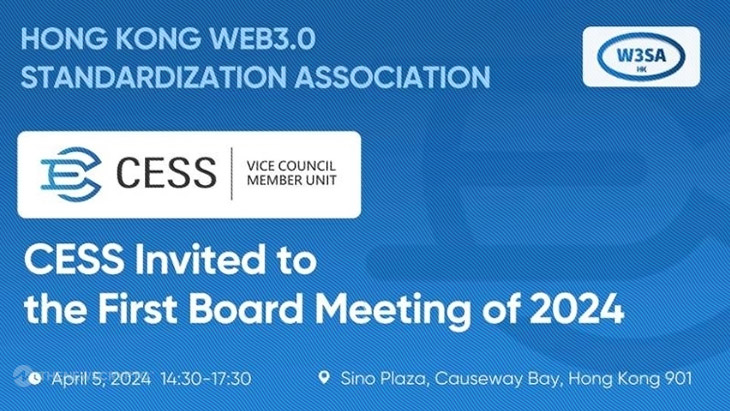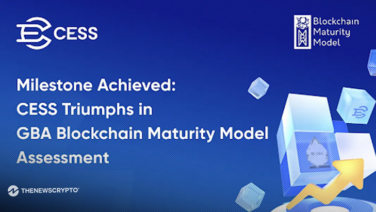CESS also took part in the Hong Kong Web3 Festival 2024 – a major first for Hong Kong’s Web3 space and an important launchpad for Web3 collaboration, innovation, and adoption
CESS (Cumulus Encrypted Storage System), the leading blockchain-based decentralized storage and content delivery blockchain, officially joined the Hong Kong Web3.0 Standardization Association and was invited to the association’s first official board meeting of 2024. This development came soon after the IEEE (Institute of Electrical and Electronics Engineers) announced the approval of CESS’s application for standard number P3233 – the Standard for Blockchain-Based Decentralized Storage Protocol Specification – in what industry observers are calling groundbreaking events that attest to the recognition by the tech community of CESS’s authority and technical expertise in the field of decentralized storage.
The CESS team is also attending the Hong Kong Web3.0 Festival 2024, which attracted over 50,000 attendees and featured 300 global speakers, 100 exhibitors, and approximately 200 side events. Building on the momentum of last year’s event, this year’s conference is being held between April 6 and 9 and has brought together the world’s brightest Web3 minds and innovators. Alongside regulatory representatives from Hong Kong, the attendees – including CESS, as golden sponsors and conference exhibitors – conducted a comprehensive deep dive into digital asset regulation policies, discussing opportunities for cooperation and collaboration as well as organization and planning that can help promote Web3 development and advancement.
As such, the event is considered to be a major leap forward for the development and standardization of decentralized storage technology on a global scale, and CESS participated as an independent attendee and advisor for a wide range of initiatives looking to build a better, faster, safer, and more inclusive decentralized Web3 future for all. According to company leaders, CESS’s participation at the Hong Kong Web3.0 Standardization Association’s first meeting of 2024 demonstrates the project’s deep involvement and contribution to standardization initiatives for Web3, as well as CESS’s technological innovation and leadership in driving the decentralized storage industry toward more standardized and regulated development.
CESS Many Innovations for Web3 Advancement
According to CESS co-founder and Chairman Nick Zaldastani, CESS was built from the ground up to meet the needs of a rapidly growing and expanding Web3 data and content space. CESS is a blockchain-powered decentralized cloud storage and Content Delivery Network (CDN) that provides high-frequency dynamic data storage and retrieval for Web3 and supports large-scale enterprise-level storage. CESS was a pioneering innovator of Decentralized Object Storage Service (DeOSS), and the project continues to operate at the bleeding edge of the Web3 space.
In particular, the project was designed to overcome issues stemming from a lack of cross-chain compatibility, network congestion, poor user incentives, unreliable security, and onboarding challenges – all of which have stymied the growth and adoption of Web3 services and applications. By delivering fast and decentralized blockchain-based solutions for global problems in the data storage, retrieval, and content delivery spaces, CESS is becoming the go-to solution for use cases and applications of all kinds.
Toward that end, CESS has developed several innovative solutions that are helping to drive the industry forward. One is CESS’s DePIN (Decentralized Physical Infrastructure Network), which is a global network of nodes that is expected to become the accepted standard for fast, safe, secure, and cost-effective data storage, retrieval, and delivery for millions of global users. The other is CESS’s data value network. Together, CESS not only delivers secure massive storage, millisecond-level retrieval, seamless online data sharing, and more, but it also enables assets, currency, and value to flow freely over the internet. This helps create a decentralized data value network in which crypto token incentives and rewards bring idle storage and other resources, as well as user participation, to the ecosystem. Resources can then be used by developers, creators, consumers, and others, while transparent rewards and participation are the key capabilities that keep the system running. They also ensure that data control and monetization remain in the hands of the owners.
Competing Blockchains and the Standardization of Web3
Today’s world is one of many competing blockchain protocols, chains, and capabilities. Standardization will become increasingly critical in the future because, without it, seamless interaction and collaboration between competing blockchain technologies and applications will be difficult. With standardization, users can reap the benefits of vastly improved development efficiency, reduced compatibility issues, enhanced innovation, and better security of user data and privacy. Standardization also provides developers with the guidelines needed to build a more consistent and reliable user experience, which is important for user onboarding and deployment.
Through focused partnerships and participation in conferences and collaborative initiatives such as the Hong Kong Web3 Festival 2024 and the Honk Kong Web3.0 Standardization Association, CESS is reaffirming its commitment to exploring and formulating industry standards with other leaders in the Web3 space, while simultaneously promoting the healthy development of the global Web3 ecosystem. Users worldwide will then be able to enjoy more secure, reliable, and efficient decentralized data services, and by having goal-oriented platforms and projects working together, CESS and the Association hope to better promote knowledge sharing, technical exchange, and cooperation that can accelerate the adoption and implementation of Web3 technology across the board.
CESS maintains its commitment to upholding the spirit of innovation and the promotion of decentralized cloud storage and CDN technology and continues to work with the Association and other aligned parties as part of its manifesto of contributing to the development of a more transparent, equitable, and secure Web3 ecosystem for all, one that delivers Web3’s promise of a fair, open, transparent, equitable, and interconnected data value network.








